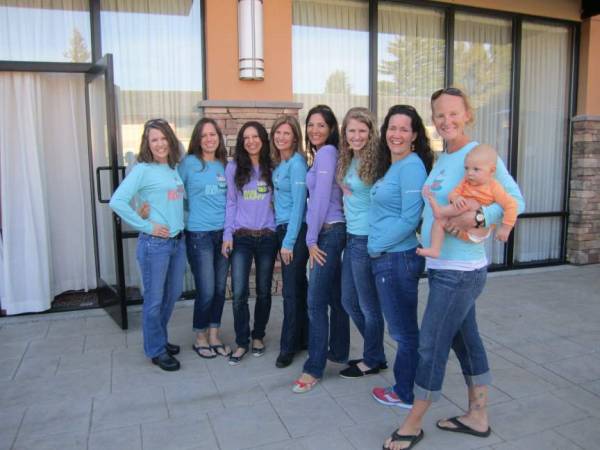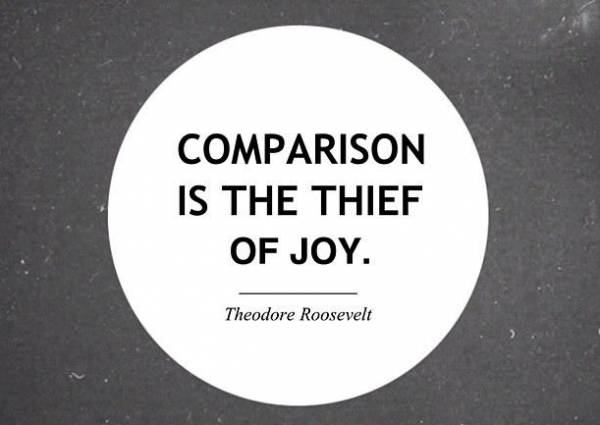After reading a Facebook status you berate yourself because your friend’s twenty-month-old potty trained herself, while you sent extra clothes to school with your child until he was six, just in case. And due to a Tweet you saw, you’re eating celery and carrot sticks for lunch because your friend lost two pounds this week and you’ve been on a plateau for almost a month. When we are all constantly connected by social media, it is difficult to not compare ourselves to others.
We’ve all seen the meme, and I guarantee that it’s true – you will never be satisfied with your life when you are comparing it to someone else’s highlight reel. When we compare our everyday life to the polished highlights that people are willing to share with the world, we are setting ourselves up for disappointment. The key to keeping our sanity and loving the lives we lead depends on the comparisons we allow ourselves to make.
Nobody Really Looks as Good as Their Facebook
We’ve all seen the comparisons of celebrity photos that have been Photoshopped and those that are untouched. We all know that the edited versions put images in our brains that are unobtainable. Seriously, the models in the pictures – even with the help of hair, make-up, and wardrobe people – don’t really look like that. Why do we think that we are worth any less because we don’t either?
And you know what? Us regular, non-celebrity folk do the same thing. Yes, our friends and loved ones can make us feel fat and ugly with the pictures they select to post. I’m not saying we edit or Photoshop (although with all of the filters on Facebook and Instagram, we are actually doing that). I’m simply saying that when we are posting pictures of ourselves to social media, we pick the shots that make us look the best.
Duh! I mean, who wants to post the selfie that was taken from a lower angle and gives us a double chin? Not me.
Here is an example for you:

The above pictures were both taken at Ragnar Trail Zion this past April with just about twenty minutes passing between the photos. Which one do you think I posted to Facebook and Instagram?
Yeah, you can bet your booties I posted the one on the left. I obviously knew that picture was being taken. I angled my body, lifted my chin, smiled, and even gave a little booty-pop. The official race photo on the right was a candid shot. I’ve got a weird expression on my face, the race belt isn’t helping my cause, my legs look heavier, and it’s really hard to booty pop when you’re running.
I’m not saying that it’s a bad thing to pick our favorite pictures and put our best foot forward (shoot, I obviously do it), I just want everyone to keep in mind that the pictures we see posted have undergone scrutiny and have been selected. I can almost guarantee that the majority of the pics we see are not the only picture that was taken of that moment, but rather the best that was taken.
How many selfies do you have to take before you are satisfied and willing to broadcast it out to the world? Professional athlete and Oiselle spokesperson, Lauren Fleshman, wrote a great post on keeping it real about our body image.
Choose Your Competition (and Comparison) Wisely
Appearance comparisons are not the only comparisons that we need to be careful making. We also need to be aware of the comparisons we make when it comes to performance.
I have seven girlfriends I meet up with annually for a running adventure. Three of them are Boston Qualifiers, and I’m telling you these girls are speedy! Unless something goes horribly wrong for them, I am never going to beat them in a race. And that’s okay.

Now, don’t get me wrong. I’m not saying you shouldn’t be competitive or expect a lot from yourself. I like to say I’m not a competitive person, but the people who know me openly roll their eyes and call me out when I try to make that claim. But no matter how competitive you are, you need to choose your competition wisely.
Race directors help you do this to some degree by breaking races into age groups, but sometimes this isn’t enough. I live in a college town with great winter weather and flat, fast terrain. This draws a lot of Olympic hopefuls here for year-round training. Am I going to beat someone who has made it to the Olympic trials? Um, no. But you know who I have a good chance of beating? Myself.
Compare Apples to Apples
But I implore you to be kind with this self-comparison, too. Just coming back from an injury? Is it early in the season? Have you been too busy at work or with the kids to get in adequate training? If you answered yes to any of these questions, don’t expect to set a personal record at your next race.
It is great to push yourself and you should always be working towards improvement, but make sure you’re comparing apples to apples. There are a lot of factors to take into consideration:
- Do you have the base miles in?
- Are the courses comparable?
- When did you set your personal record?
I cut back on mileage during the summer because of the heat and humidity. With this in mind, I am okay with my better race times not coming until the middle or end of race season.
I know it seems basic, but all races are not comparable, even if they are the same distance.
While I set my marathon record on the flat, fast Rock-n-Roll Arizona course, I added two hours to that time when I raced the Mongolia Sunrise to Sunset trail marathon. I was better trained for Mongolia, but with the different terrain and elevation profile, it didn’t matter.
And the timing of your record should come in to play, too. I started competing in local 5- and 10Ks in my early twenties. Over fifteen years later I’ve lost a little bit of my giddy-up. Why do you think race directors have age groups? If I’m not going to compare myself to another 22-year-old, why would I compare my current times to the times I ran when I was 22? When you are comparing your records give yourself a break and limit it to five to ten year increments.

How Comparisons Can Help You
Comparisons can be beneficial if you approach them with the right frame of mind. If you are making realistic comparisons to push yourself to be a better you, then go for it. If the comparisons you are making make you feel worse about yourself, then it’s time to reconsider.
If you’re struggling with the comparisons you are making, here are some things to keep in mind:
- Are the comparisons you’re making realistic? (i.e. are you comparing yours abs to those of a Photoshopped super model or your race times to Kara Goucher?
- Are you setting yourself up for failure? Don’t expect to set a personal record in a race if you didn’t put in the work.
- Are you comparing apples to apples? It’s okay that you added two minutes to your 10K time on that extra hilly course.
So, relish healthy competition and strive to be better in all aspects of your life, just don’t let the lure of comparison sabotage your happiness. We are all responsible for our own happiness and that is more easily obtained when we focus on ourselves rather than falling into the cycle of constantly comparing ourselves to others.
Photo 1 courtesy of Shutterstock.






